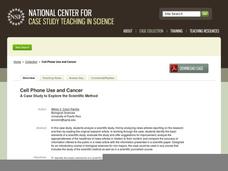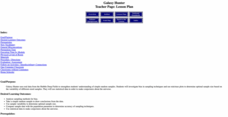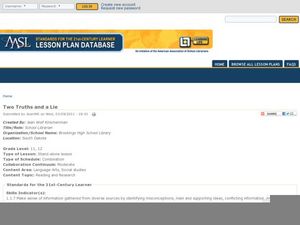Curated OER
Identifying Bias
In this identifying bias worksheet, students read about bias and how to identify it in their reading. They are given a list of sources of bias and they read 2 paragraphs and determine the kind of bias and their reasoning for choosing the...
Curated OER
Checking Sources For Accuracy
Middle schoolers will paraphrase a resource without plagiarizing. Then rewrite after reading text. They then evaluate the site or reference they are using for accuracy. In the end, they complete a note-taking organizer.
Curated OER
Comparing Visual Interpretations and Actual Events: War & Battle
A Venn Diagram is used to compare artistic and historical representations of a single event. Young analysts view the provided images, read textbook descriptions, and discuss the validity of each representation in terms of bias and...
Curated OER
Scientific Data: It's Not as Pretty as It Looks!
The difference between accuracy and precision is fundamental for high school science learners. Using test kits for nitrate concentration in water, they compare readings with each other. They consider the accuracy, precision, and bias of...
American Press Institute
In the Newsroom: The Fairness Formula
Reporting the news is easy, right? Think again! Show young scholars the difficult choices journalists make every day through a lesson that includes reading, writing, and discussion elements. Individuals compare the language and sources...
News Literacy Project
News Goggles: Lionel Ramos, Oklahoma Watch
Given all the recent criticism of the news media and coverage, it's crucial that young people are given the tools they need to evaluate what they see, hear, and read about current events. A video interview from "News Goggles" introduces...
News Literacy Project
Fact-Check It!
Here's a lesson designed to help learners develop their digital verification skills. First, expert groups study specific digital verification skills, and in a jigsaw activity, share what they have learned with classmates. The jigsaw...
University of the Desert
Do Journalists Shape or Report the News?
Analyze the presence of negative stereotypes and biased reporting in news media, and how this affects one's understanding of other cultures. Learners read newspaper excerpts and quotes from famous personalities to discuss the power of...
Curated OER
Suspect Sources at the Republican Debate
Students review statements made during a 2007 Republican presidential for factual references. They research the statements for accuracy using internet resources. Students also examine the stated purpose of the websites used to fact check...
Curated OER
Data Handling
In this data handling learning exercise, students determine biased and unbiased questions to surveys. They explore methods of data collection and design a data collection sheet. This two-page learning exercise contains 3 multi-step...
Curated OER
Neighborhood or Slum? Snapshots of Five Points: 1827-1867
How has your local neighborhood changed throughout recent history? Young researchers evaluate census data, images, and primary source descriptions describing the living situation in the antebellum Five Points neighborhood. They consider...
Curated OER
Bipolar Transistor Biasing Circuits
For this electronics worksheet, students analyze electrical circuits to answer 21 short answer and problem solving questions about bipolar transistors.
Curated OER
Japan's Textbook Case
Students read and discuss "Japan's Refusal to Revise Textbooks Angers Neighbors." They discuss how accurately textbooks account for historical events, then collaborate to write unbiased textbook entries for current events.
Google
Advanced 5: Evaluating Credibility of Sources
How do discerning readers determine bias and credibility? Ask small groups to figure it out! First, each group is provided with either articles or videos that contain bias. They examine the resources, respond to included questions, and...
College Board
Evaluating Sources: How Credible Are They?
How can learners evaluate research sources for authority, accuracy, and credibility? By completing readings, discussions, and graphic organizers, scholars learn how to properly evaluate sources to find credible information. Additionally,...
Curated OER
How To Do an AP Euro DBQ
Are your AP classes struggling with Document Based Questions? Nip their problems in the bud with this clear and comprehensive presentation, which compares a "dazzling DBQ" to a hamburger, outlining all of the layers therein....
National Center for Case Study Teaching in Science
Cell Phone Use and Cancer
The cell phone you're using is making you deaf: news at 11:00. Oftentimes, the media uses fear tactics and other techniques to increase its audience base. In an intriguing look at the difference between scientific journals and...
C-SPAN
Polling and Public Opinion
Most people are eager to offer their opinions about topics of interest, but what's the most effective way to collect and assess these opinions as a matter of fact? High schoolers learn about the history of polling, as well as the...
Curated OER
A Snapshot in Time
Students state the main ideas of the article. They create questions to clarify the meaning of the article and to help explain the ideas. Students cite words or phrases that reveal a bias the author may have.
Curated OER
Determining Point of View
Students examine web sites to determine point of view and bias in information sources. They determine the usefulness of information based on these biases or limitations.
Curated OER
Statistical Accuracy and Reliability
Ninth graders assess the accuracy and reliability of current survey data and how it is represented. They design a survey, collect data, and use technology to analyze the data and present the results. Students examine scatter plots and...
Curated OER
Galaxy Hunter - A Cosmic Photo Safari
Space science stars journey through our night sky and take virtual photos of galaxies to investigate simple random samples. Higher math is used to analyze the data collected. Copy the evaluation/assessment questions onto a handout for...
Curated OER
Two Truths and a Lie: Internet Research Skills
It's tough for high schoolers to assess what is a credible resource and what is not. A helpful resource prompts class members to research a particular topic and record two facts—and create one lie—while documenting the sources. They then...
iCivics
NewsFeed Defenders
How can people learn to spot viral deception? Players do just that with the NewsFeed Defenders media literacy game. Scholars choose avatars and the focus of their news feeds: student life, health and wellness, or sports and...

























